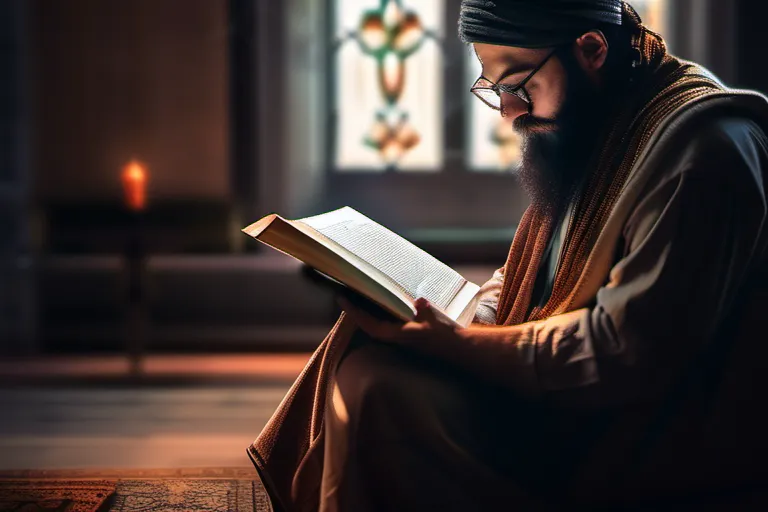Explore the profound impact of sociology of religion on spirituality, personal beliefs, and societal structures.
This article delves into the fascinating intersection of sociology, religion, and spirituality. We’ll uncover how the study of religion sheds light on our understanding of spirituality and its role in shaping our lives and societies.
The Intersection of Sociology and Religion
How has the study of sociology of religion transformed our understanding of spirituality and personal beliefs? Historically, the field emerged in the late 19th century as scholars began to explore how religious institutions shape societies and individual identities. But what exactly does this discipline teach us about life and faith?
Sociology of Religion delves into the intricate relationship between religion and society. It examines how social structures, norms, and values influence beliefs and practices. For instance, Emile Durkheim, one of the pioneers in this field, argued that religion is a fundamental aspect of human societies, serving as a binding force that unites people through shared rituals and symbols.
Think about it: could the vibrant ceremonies and traditions we observe be more than just ritualistic acts? Could they be expressions of collective identity and unity, as Durkheim suggested?
In modern times, sociologists have expanded their focus beyond organized religions to encompass new religious movements and spiritual practices. They explore how individuals make sense of their lives through diverse belief systems that may not fit traditional religious frameworks.
So, what does this mean for you? Could your personal beliefs be more fluid than you thought, shaped by the social environment around you? And how do these societal influences impact your understanding of spirituality?
Understanding Spirituality: A Sociological Perspective
Understanding spirituality from a sociological perspective can be like peeling back layers of an onion, each layer revealing more about the core of human experience. When we define sociology of religion, it’s not just about studying religious practices and beliefs but also how these shape our personal and collective lives. Spirituality, in this context, becomes a fluid concept that intertwines with societal structures, influencing everything from personal identity to communal relationships.
Consider the question: What is spirituality if not an expression of human longing for something greater than ourselves? From a sociological viewpoint, it’s the lens through which we make sense of our existence in society. It’s like a bridge that connects individual experiences with broader social and cultural narratives. How do these societal structures—such as family, community, and institutions—affect our spiritual journey?
Take for instance, how religion can act as a catalyst for personal transformation. In many societies, religious practices serve as a framework that helps individuals navigate their emotional landscapes. Whether it’s through rituals, teachings, or community support systems, religion often provides a sense of purpose and meaning. But here’s the intriguing part: how do these spiritual practices vary across different cultures? Do they shape our understanding of life and death in unique ways?
Moreover, consider the role of societal structures. These can either support or challenge individual spiritual beliefs. For example, in societies where religion is highly institutionalized, one might find a clear alignment between personal spirituality and societal norms. However, in more secular environments, individuals may have to navigate their own unique spiritual paths, often facing conflicts with established social expectations.
So, what does this tell us about the complexity of human spirituality? It suggests that our spiritual experiences are deeply intertwined with the broader social contexts we inhabit. Understanding spirituality from a sociological perspective means recognizing these interconnections and how they shape not just personal beliefs but also societal structures.
The Sociology of Religion and Personal Beliefs
How does one’s personal belief system come into being? Is it entirely a product of individual choice, or are there broader forces at play? The sociology of religion provides crucial insights into this question by exploring how societal structures shape our personal beliefs.
Imagine a garden where every flower symbolizes an individual and the soil is the social environment. Just as flowers grow in response to their surroundings, our beliefs develop within the context of society. Sociologists of religion argue that these environments—through cultural norms, community practices, and institutional influences—significantly shape what we believe.
Consider how a child grows up in a religious household. The rituals, doctrines, and values they are exposed to early on form the foundation of their faith. This is not just about personal experience; it’s about being part of a broader narrative that defines one’s identity within the community. Are these beliefs something we adopt freely or do we accept them because they align with our social roles?
The sociology of religion also delves into how different institutions—like schools, media, and workplaces—can subtly influence our beliefs. For instance, secular education systems might challenge religious teachings, fostering a critical mindset that can lead to spiritual exploration. This dynamic interaction between personal choice and societal influence is essential in understanding the complexity of belief formation.
Moreover, the sociology of religion highlights how our belief systems are not static but evolve over time, often responding to social changes. As societies undergo transformations—such as urbanization or technological advancements—the religious landscape shifts accordingly. These changes can lead to new interpretations of existing beliefs or the emergence of entirely new spiritual practices.
So, in exploring how personal beliefs are shaped by societal structures, we see that our faith is not a solitary journey but an intricate dance between individual choice and collective influence. It’s about understanding ourselves within the context of these larger forces and acknowledging their profound impact on who we are and what we believe.
Religion, Spirituality, and Society
How does religion intertwine with our daily lives, shaping societies and influencing personal beliefs? The sociology of religion provides profound insights into these questions. Imagine religion as a river that flows through history, carving paths and creating landscapes that define communities. This river nourishes individuals with its teachings and guides them through the complexities of life.
Religion has been a cornerstone in societal structures for millennia, providing moral frameworks and social norms. But how exactly does it do this? Through rituals, traditions, and community practices, religion fosters a sense of belonging and identity. It’s like a map that helps us navigate the uncharted territories of life.
Consider the role of religion in shaping social policies and institutions. Laws, healthcare systems, education, and even economic structures are often influenced by religious values. For instance, how do religions impact views on abortion, LGBTQ+ rights, or environmental stewardship? These influences can be subtle yet significant, guiding public discourse and policy-making.
Moreover, religion plays a crucial role in addressing social issues such as poverty, inequality, and conflict. It mobilizes communities to work towards common goals, often through charitable activities and humanitarian efforts. Can you imagine a world without the charity work of religious organizations? How different would our approach to solving societal problems be?
The sociology of religion also helps us understand the dynamics between different religions in pluralistic societies. Tensions and cooperation among various faiths shape intercultural relations, influencing peace or conflict within communities. How does the coexistence of multiple religious traditions impact social cohesion? It’s a complex dance where each step is carefully measured to maintain harmony.
Lastly, religion often serves as a source of spiritual sustenance for individuals seeking meaning and purpose in life. In a world full of uncertainties, it offers comfort and guidance. How do you find your path through the chaos of modern life? Does your religion play a role in this journey?
The sociology of religion teaches us that spirituality and personal beliefs are not just private matters but have far-reaching impacts on society. It’s a fascinating field that delves into the intricate connections between individual faith, social structures, and collective behavior. As we continue to explore these topics, we uncover layers of understanding about ourselves and our world.
Contemporary Issues in the Sociology of Religion
What does it mean to live in a world where religion and spirituality are constantly under scrutiny by sociologists? Sociology of Religion seeks to explore how religious beliefs, practices, and institutions shape society and individual lives. Today, this field is grappling with numerous contemporary issues that challenge traditional understandings of faith.
One pressing debate revolves around the role of secularization. Is religion losing its grip on modern societies as more people claim to be non-religious or atheist? Or are new forms of spirituality emerging, blending old traditions with modern lifestyles?
The rise of global religions and the spread of religious diversity across nations pose another set of questions. How do these changes affect local cultures and social structures? Can we predict how different societies will adapt to such shifts in spiritual landscapes?
Another challenge is the impact of technology on religion. With the internet and social media, how are traditional religious practices being transformed? Are online communities replacing physical ones, or are they just supplementary?
The rise of fundamentalism and its influence on politics also raises critical questions. How does religious extremism impact society at large? Can sociologists understand and predict the consequences of such movements without falling into simplistic generalizations?
Lastly, the increasing emphasis on individual choice in spirituality means that people are no longer bound by traditional denominations or practices. This leads to a fragmented religious landscape where beliefs can be picked and chosen like spices in a recipe. How does this impact the collective identity of societies?
The Future of Sociology, Religion, and Spirituality
As we gaze into the future, the interplay between sociology, religion, and spirituality will undoubtedly continue to shape our understanding of human existence. Will technology revolutionize religious practices? How might climate change influence spiritual beliefs and communal values? These are questions that sociologists and scholars in related fields are beginning to ponder.
In the coming years, we can expect an increasing focus on how digital tools and virtual reality may transform traditional religious rituals. Could online platforms become sanctuaries for people seeking spiritual solace from anywhere? Will the boundaries between the physical and digital realms blur, creating new forms of spiritual experience? These developments might redefine what it means to be religious in a world where connections are instantaneous yet often superficial.
The impact of climate change on religion and spirituality is another critical area. As natural disasters become more frequent and severe, how will communities turn to faith for resilience? Will the concept of cosmic spirituality, connecting with the larger universe, gain prominence as people seek answers in nature’s unpredictable rhythms? Sociologists might explore these themes through case studies or surveys, uncovering new narratives that challenge our existing notions of environmental stewardship.
The future holds exciting possibilities for how these fields intersect. As we move forward, it is crucial to remain open to the unexpected, just as early sociologists were when studying religion in its various forms. By embracing the dynamic nature of spiritual exploration, we can better navigate the challenges and opportunities that lie ahead, ensuring that our understanding of human spirituality remains both relevant and expansive.
So, let us ponder together: How will these trends redefine the very essence of spirituality in life? Will they lead to a more connected or fragmented society? The answers might surprise us, but one thing is certain—our journey through the future of sociology, religion, and spirituality will be enriching and enlightening.
Conclusion
 By the end of this article, you’ll have a deeper appreciation for the complex relationship between sociology, religion, and spirituality. You’ll also gain insights into how these fields can help us navigate our personal beliefs and societal structures more effectively.
By the end of this article, you’ll have a deeper appreciation for the complex relationship between sociology, religion, and spirituality. You’ll also gain insights into how these fields can help us navigate our personal beliefs and societal structures more effectively.











